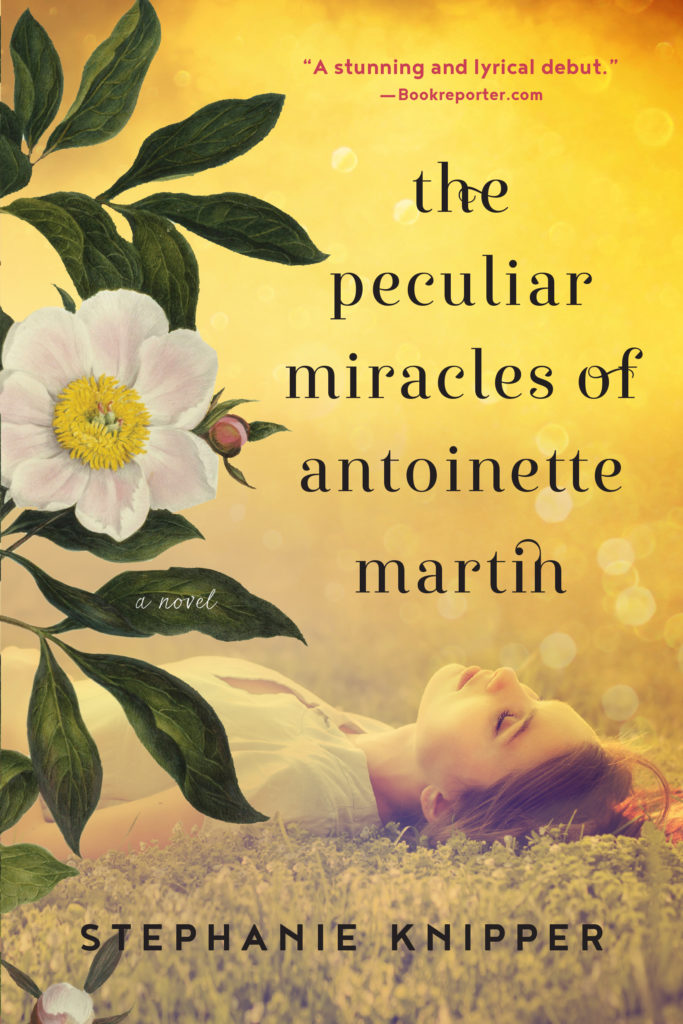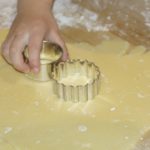Welcome to our #FridayReads feature on the blog, where we’ll be excerpting a chapter of one of our favorite books to start your weekend. This week, it’s Stephanie Knipper’s The Peculiar Miracles of Antoinette Martin, a spellbinding debut about a wondrously gifted child and the family that she helps to heal.
Scroll down for an excerpt.

The Peculiar Miracles of Antoinette Martin
Antoinette sits on the chair next to me, bouncing. Her small green coat is folded over the arm rest. She is three-and-a-half. Her feet don’t reach the floor. To bounce, she pushes against the arm-rests, lifting herself out of the seat. Then she lets go. Gravity does the rest.
It took three months to get this appointment. Now that it’s here, I want to be somewhere else, anywhere else.
This morning, Dad held Antoinette as he paced the kitchen. She arched her back and groaned. In the past three years, he has grown soft around the middle and most of his hair is gone. He puffed as he tried to calm Antoinette. “What do you want, sweetie?” he asked. He is big enough to wrap his arms around her twice, but Antoinette is difficult to contain.
“She wants to get down,” I said. After scheduling this appointment, I started making lists. The first time Antoinette walked. The first time she crawled. Her first bites of solid food. There had to be something that would prove she was normal. The lists were in my purse somewhere, but I needed to find them.
“We can cancel our trip,” Mom said. They were attending a commercial flower growers conference in Missouri. It was the first weekend in December and a light snow had fallen.
Antoinette rocked back and forth in Dad’s arms like a metronome. I found the crumpled pages on the bottom of my purse and flattened them on the kitchen table. “We’ll be fine, Mom.”
Antoinette shrieked.
“Just put her down, Dad,” I said as I dumped everything back into my purse.
As soon as Antoinette’s feet touched the ground, she toddled over to me, her gaze locked on something over my shoulder. When she reached the table, she buried her face against my knees and wrapped her arms around my legs. Then she sighed with contentment as if I was her whole world.
Now in the waiting room, she sighs the same way and stops bouncing. She leans into me, and despite the pressure building in my chest, I smile. She’s happy. That has to count for something.
Finally, the waiting room door opens, and a nurse in pink scrubs says, “Antoinette Martin?”
I pick up Antoinette’s green coat, take her hand, and follow the nurse out of the waiting room. As I walk, I remember the last thing Mom said before they left. “You’re still her mother. Nothing can change that.”
But that’s exactly what I’m afraid of. What if I can’t mother a broken child?
***
Someone painted blue and yellow fish on the walls of the exam room. White bubbles float from their mouths to the ceiling. All of a sudden, I’m like my sister, Lily. I count the fish. Five. Then I count the bubbles. Seventeen.
Not good. My chest tightens, and I slip a nitro-glycerin pill under my tongue.
“Is she always so tactile?” Dr. Ketters asks. She is at least sixty. The gold buttons on her purple dress gap about the middle, and two inches of white slip show beneath her dress.
Antoinette sits on the exam table, scratching her fingers across its surface. Phft. Phft. She laughs at the sound her fingers make. Her green coat is next to her. It’s so tiny.
Doctor Ketters stands in front of Antoinette, studying her. She hasn’t listened to Antoinette’s chest, or looked in her eyes or ears.
“She touches everything,” I say. That must be normal. Kids grabbed things. “I have lists.” I give the crumpled sheets to the doctor. “When she walked. What she eats. Textures she likes….”
Dr. Ketters glances at my papers, and then puts them aside. “Does she make eye contact?” Like a magician, she pulls a pink feather from her lab coat pocket and waves it in front of Antoinette.
Antoinette ignores it. She looks up and to the left. “She stares at paintings for hours,” I say. I stopped painting after Antoinette was born, but I still have my art books. Antoinette and I flip through them at night. “And music. She loves music.” The nitro pill has dissolved, but my heart still hurts.
Dr. Ketters jots some notes in Antoinette’s file. She has been in the room for less than five minutes. When she looks up and smiles softly, I know something is wrong.
“Antoinette displays a lot of autistic behaviors,” she says. “She’s not classically autistic. She’s affectionate.” Right now, Antoinette is leaning into me, lacing her fingers through mine.
“You don’t see that a lot in autism,” she says, “even though it’s a spectrum disorder, and people can be anywhere from high functioning with Aspergers to severely impaired.” With the words “severely impaired,” her eyes slide to Antoinette.
I nod as if we are talking about the weather, but I don’t want to hear anything else. I set Antoinette on the ground, ignoring her upraised hands. I gather her green coat and hold it out to her. “Thank you for your time. Come on, Antoinette. Put your coat on.”
Antoinette flaps her hands and pushes the coat away.
Dr. Ketters continues as if I haven’t said anything. “I can’t give an exact diagnosis. She doesn’t fit neatly into any one category. But I can tell you that she will most likely require life-long care.”
Please stop talking. The pressure in my chest grows until I think it might explode. I shake the coat at Antoinette. “Antoinette. Let’s go.”
“Is her father in the picture?” The sympathy in the doctor’s voice is painful.
Finally, I drop Antoinette’s coat and shake my head. I’m dizzy with grief. “It’s just me.”
“Institutions are nicer now. Caring for her by yourself is going to be hard.”
I lose my breath and I feel something crushing my chest. Then I feel a small hand in mine. When I look down, Antoinette’s eyes are closed and she’s humming.
She hasn’t hummed since last September, and I realize how much I missed the sound of her voice. The pressure in my chest eases. Her touch has always made me feel better. When I pick her up, she closes her eyes and rests her head on my shoulder.
Dr. Ketters is still talking when I walk out of the exam room, but I’m not listening. As we leave, I think of the second list I made. The one I didn’t show the doctor. On it, I listed the way Antoinette’s fingers clasp mine when we walk in the garden. The way my heart beats easier when she is next to me. The way she taps my back, and I know it means: I love you.
***
Lily’s house has a view of the Ohio River. I see a sliver of the river through the window above the kitchen sink. It is late afternoon, and the day has turned gray.
Antoinette slept briefly in the car on the drive from the hospital to Lily’s house. Twenty minutes. When she woke, I picked her up and whispered in her ear. “Do it again.” Then I hummed, trying to recreate the noise she made at the doctor’s office. She didn’t make a sound.
Now, in Lily’s house, she sits on the floor, tracing her fingers along the grout lines in the tile. Lily and I lean against the kitchen counter. I am too agitated to sit.
“The doctor said something’s wrong?” Lily asks. She taps her fingers against her leg.
I nod, because I can’t say the words out loud.
Something is wrong.
With my daughter.
“I’m sorry,” she whispers. I see my pain reflected in her eyes.
“Will she get better?” Lily starts counting. Her lips barely move, but I know what she’s doing. If I thought counting would help, I’d do it too.
“No,” I say. “She won’t get better.” The words crush me. I drop my head to my hand. “Could I get a drink?” Though it’s cold outside, Lily’s house is warm.
Antoinette is sitting in front of the sink, and Lily avoids walking near her. Irritation flashes through me. Antoinette isn’t contagious.
I had hoped that stopping by Lily’s house on the way home from the doctor’s office would help me feel better. Instead, I feel worse. Lily is more reticent than usual.
A holly wreath hangs from a brass hook on the door leading from Lily’s kitchen to her deck. I picture her walking alone through a parking lot filled with cut Christmas trees, selecting the wreath.
Lily takes a glass from the cabinet next to the sink and drops some ice into it. She fills it with tap water, watching Antoinette the entire time. Then she hands me the glass.
I set it on the kitchen counter. “I miss you.”
“Is there a treatment?” Lily asks. She looks at Antoinette, who has closed her eyes and is rocking side to side.
I don’t want to talk about it. “Mom and Dad are at a conference in Missouri. Come home with me. Just for the weekend.” I don’t want to be alone. I don’t want to think about Dr. Ketters’ words. How can I provide a lifetime of care when I don’t have a lifetime left?
Antoinette kicks her heels against the floor.
Lily appears mesmerized. “I can’t,” she says. “Not this weekend.”
“It’s getting late,” I say. “I need to get back to the farm.” I drink the water, and as I take my glass to the sink, it slips from my hand and shatters on the tile floor.
I kneel to pick up the glass shards and slice open my index finger. Bright red blood drips from my hand, staining the floor.
“Are you okay?” Lily grabs a napkin from the table and presses it against my finger. In a minute, it’s soaked through with blood. She folds it until she finds a clean section and dabs at the cut. “I think you need stitches.”
“I’m fine.” I don’t need her help. I take the napkin and press it against the cut.
“I’ll wrap it for you.” She runs to the bathroom and returns with a Band-Aid. “It’s deep,” she says as she holds my hand under water. She dries it and applies the bandage.
As she does, I feel a hand against my leg. Antoinette taps my leg and raises her hands. “It’s okay,” I say as I pick her up. “Mommy’s fine.”
Antoinette rests her head in the crook of my neck and pats my cheek. Then, for the second time today, she hums, and I forget the pain in my finger.
“How about next weekend?” Lily is saying. “I’ll come home then.”
I nod absentmindedly and walk toward the front door. I’m fixated on the sound coming from my daughter’s lips.
“I miss you too,” Lily says, but she sounds unsure of herself. She hugs me and holds on tight.
A tall man with dark hair is standing on Lily’s doorstep when she opens the door. “Didn’t know you had company, Lils,” he says.
He is handsome in a too-perfect kind of way. Not at all the type of guy I picture Lily with. “We’re just leaving,” I say as I carry Antoinette to the car.
The man nods his head and waves his hand in a flourish as if tipping a cap. “Will Grayson, at your service.”
I nod, but I’m not paying attention. I’m fascinated by the sound of my daughter’s voice.
***
Later, I put Antoinette to bed. She slept the entire trip home, and she was still asleep when we pulled up to the farm. I don’t blame her. It’s been a busy day.
It’s only after settling her into bed that I remember my finger. I go into the bathroom and sit on the edge of the tub. It doesn’t hurt, but I want to clean it again.
I undo the bandage, expecting to see a long gash on my finger, but my skin is intact. There isn’t a single mark anywhere.
Hooked? You can buy the book here.
Amazon | B&N | Indiebound | Workman



No Comments